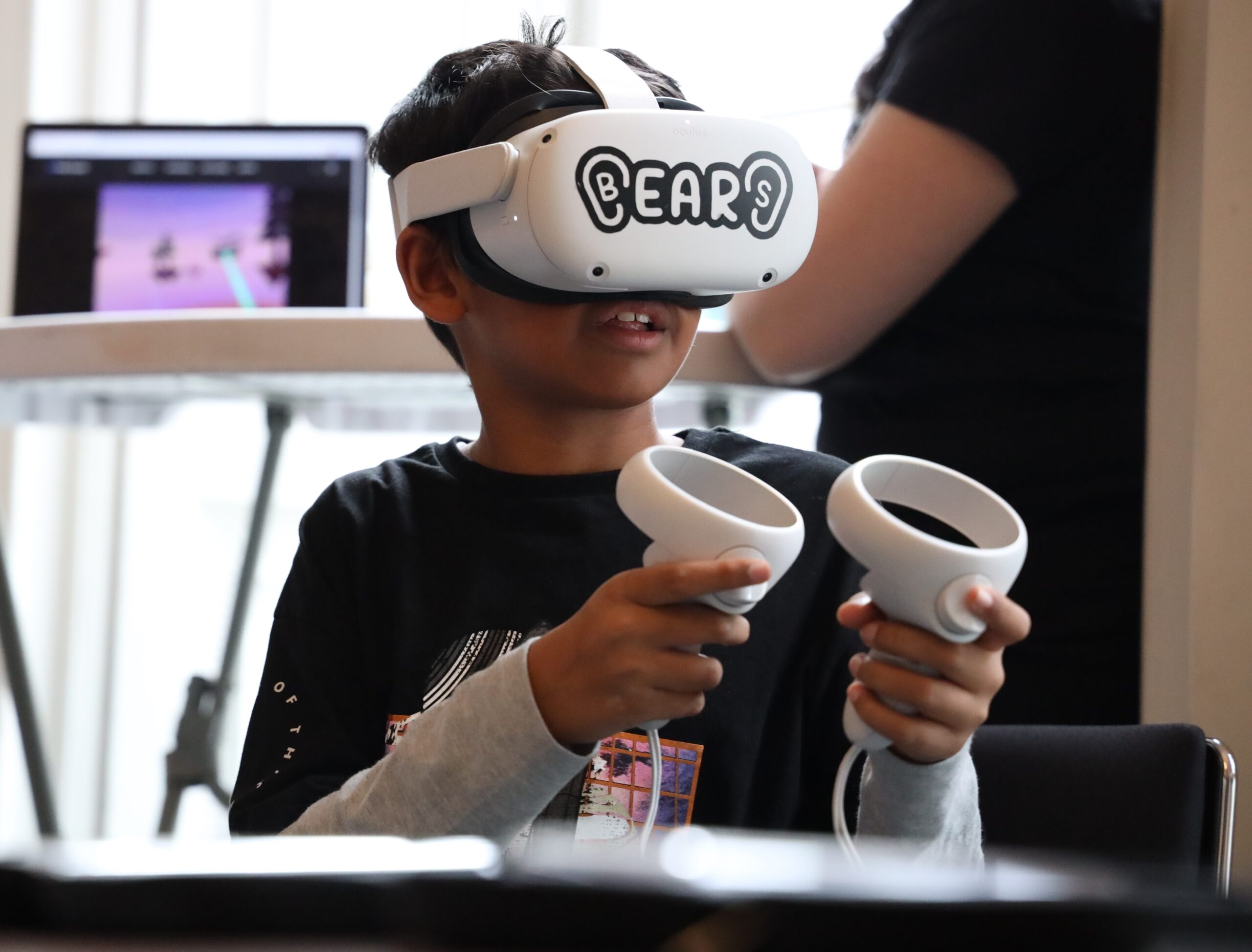Research projects that need your involvement
Research projects requesting your input
We want to make our BEARS research more inclusive, and make it easier for all families to take part. We are doing focus groups or interviews with stakeholders to find out why families decide not to take part in BEARS, and how research could be more diverse in the future.
If you are an audiologist who works with children involved in the BEARS study, we would like to hear from you. For more information, please email r.nightingale@ucl.ac.uk

Responses from UK professionals working in the field of cochlear implants only, please.
Wayne Ellis, Clinical Scientist in Audiology and doctoral student at University College London Hospital (UCLH), is inviting UK cochlear implant clinicians to participate in a brief (5-10 minute) online questionnaire. The study aims to explore perspectives on objective auditory discrimination testing and its potential role in clinical practice.
The research aims to gather valuable insights into the clinical utility, feasibility, and value of these tests for improving patient outcomes and supporting cochlear implant programming decisions.
We encourage all professionals working with cochlear implant recipients to complete the questionnaire and contribute to this important research.
Your responses will remain anonymous and confidential. The study has been approved by the University of Manchester Faculty Research Ethics Committee.
Please click here or scan the QR code below to complete the questionnaire.

Thank you for your time and valuable input.
In the UK D/deaf children are offered two cochlear implants whereas D/deaf adults are offered one cochlear implant, except in special circumstances.
We are interested in obtaining the perspectives of (1) Adult cochlear implant users and (2) Cochlear implant professionals regarding your views on
- Whether adults in the UK should be offered one or two cochlear implants?
- The potential advantages and disadvantages of receiving two cochlear implants.
- How well current audiology tests reflect real-world listening? (Are the tests representative of hearing situations outside of the clinical setting?)
The survey takes 10-15 minutes to complete. This survey is anonymous and can’t be tracked back to any specific individual.
COCHLEAR IMPLANT USER COCHLEAR IMPLANT PROFESSIONAL
| Click this link to CI User Survey | Click this link to CI Professional Survey |
| OR | OR |
| Scan QR code below to survey: | Scan QR code below to survey: |
 |
 |
Alternatively, you can use the follow link to USAIS website.
More information about the surveys can be found on the information sheets which are available below:
- Click this link for additional CI User participant information
- Click this link for additional Cochlear Implant Professional information
(ERGO no: 102255 and 103001)
Alternatively please contact Isabel McGauley i.mcgauley@soton.ac.uk or Prof Nicci Campbell n.g.campbell@soton.ac.uk for more information.
A hearing aid project in Nepal is looking for a volunteer audiologist(s) willing to go for 3 or more months. It would provide staff training and also the completion of the important research project. The University of Warwick, in partnership with the University of Manchester and Green Pastures Hospital, Pokhara, Nepal, is due to start field trials of a low cost, high quality hearing aid imminently. This has been in development for several years, and initial prototypes are ready for trials. It meets or exceeds NHS standards and is a rechargeable, RIC aid with Bluetooth and tablet based fitting software. Volunteers would need to be self-funded, though living expenses in Nepal are relatively low. There would also need to be a visa negotiated, but the project is very keen to offer support with this for anyone interested.
The audiology department at the Ear Centre at Green Pastures Hospital is well equipped, with three rooms, within which are 4 ‘sound proof’ rooms and facilities for PTA, Tymp, ABR, vHIT, VEMP, REM. It currently has two Nepali BSc level staff, who have been trained in Kathmandu as audiologists and speech therapists. They spend most of their time doing PTAs and fitting aids. They currently have limited experience or expertise in more advanced testing or fitting. (There is a separate speech therapy department and staff). There have been more senior Nepali audiologists with MSc’s working in the department in the past, but they have taken posts overseas, and there are very few in the country, and none currently available who could support the trial.
Pokhara is an amazing city, with its lakes, and being so close to the mountains. There are lots of tourist hotels and facilities, and it is a major centre for trekking in the Annapurnas. Anyone interested would need to be self-funding, although a contribution towards the flight can be discussed. Internal travel from Kathmandu to Pokhara, by bus (takes several hours but interesting) or short flight (about £100 each way). Living costs in Nepal are very reasonable.
A short CV and expression of interest would be required, which would be reviewed by the team.
For more information, contact Clare Roberts, clare.roberts@warwick.ac.uk
We are looking for people to take part who:
Are qualified healthcare professionals with experience of discussing bone conduction hearing implants with eligible patients in the UK.
About the research
This study aims to explore the experiences and perspectives of clinicians on the decision-making process for patients offered a BCHI. It will aim to understand what health professionals view as important for patients deciding whether or not to accept a BCHI, what they think may be barriers and facilitators to BCHI acceptance and their experiences of, and thoughts about, supporting patients who are making this decision.
What does taking part involve?
- A single interview either by phone call, video call or via email
- Opportunity to enter a prize draw for a shopping voucher
PARTICIPANTS NEEDED: A Study Exploring Health Professionals’ Experiences of Supporting Bone Conduction Hearing Implant (BCHI) Candidates with Decision Making
How do I sign up?
Scan the QR code or email the researcher for more information. Researcher: Eve Edmonds (eve.edmonds@postgrad.manchester.ac.uk) Supervisor: Dr Rachael Powell (rachael.powell@manchester.ac.uk)

We are looking for hearing healthcare professionals to take part in our online Delphi study to develop guidelines for delivering holistic hearing healthcare. The study will consist of three iterative online surveys that should not take more than 20 minutes to complete each time.
If you would like to know more about this research or take part, please fill out the interest form, and Dr Katelynn Slade, k.slade@lboro.ac.uk, will be in touch shortly. Interest form: https://loughboroughssehs.eu.qualtrics.com/jfe/form/SV_3VpeQuig2abJuyG
We are reaching out to Audiologists all over the world to take part in online surveys from our research group at the University of Canterbury. Each of the survey links below will take you to a unique survey that asks questions about the profession of Audiology. For each survey you complete, you can go into a draw to win one of 50 Amazon gift cards valued at $20 USD. This study has been reviewed and approved by the University of Canterbury Human Research Ethics Committee. If you have any questions or want more information, please contact our Thesis Supervisor Dr Ziva Shai Campbell: ZivaShai.Campbell@Canterbury.ac.nz.
- Survey aiming to explore the intricate dynamics of work-life balance, along with the various factors that may impact it. All audiologists are invited to participate in this survey. https://canterbury.qualtrics.com/jfe/form/SV_29brZ3xiNemK0Jg
- Survey exploring pay differences between cisgender and non-cisgender audiologists and heterosexual and non-heterosexual audiologists. All audiologists are invited to participate in this survey, regardless of gender identity or sexual orientation. https://canterbury.qualtrics.com/jfe/form/SV_42Pu0SbjythMrFs
- Survey investigating variables/factors that influence the remuneration/earnings of male and female audiologists. All audiologists are invited to participate in this survey. https://canterbury.qualtrics.com/jfe/form/SV_9XgKrLVBE1hKPeS
We are running an online survey about the use of artificial intelligence (AI) to support diagnoses in primary healthcare. The focus is specifically on the diagnosis of a common childhood hearing condition ‘Glue Ear’ (Otitis Media with Effusion or OME), and a newly developed diagnosis support application.
We are seeking participants who belong to either of the following two groups:
Group 1: Anyone who is
• adult (18 years and above), and
• a carer or a parent of a child who has experienced ‘Glue Ear’, or is someone who has experienced the condition themselves, and
• aware of Artificial Intelligence.
Group 2: Clinicians who are
• experienced in working in the NHS (hospitals, paediatric clinics, Audiology/ENT clinics, community care, primary care), and
• familiar with the primary care setting in the UK, and
• experienced in managing patients with OME, and
• aware of Artificial Intelligence.
Background
‘Glue Ear’ / OME is one of the most common causes of childhood hearing impairment and disability. It is estimated that more than 80% of children will have OME before the age of 10. This places a significant cost burden on the NHS with approximately 200,000 children with OME seen annually in primary care. Delayed diagnosis and poorly managed cases can result in severe and persistent OME with surgical treatment becoming the only management option, leading to long waiting times, and excessively high costs for the NHS.
The novel diagnosis support application uses highly sophisticated, fast, and non-invasive technology called Wideband Absorbance Immittance (WAI) to measure the function of the eardrum and middle ear in great detail. Using high powered computing, the complex WAI data is processed to extract useful information, make predictions, and inform decision making to help diagnose ‘Glue Ear’ / OME. The project is supported by the National Institute for Health and Care Research (https://fundingawards.nihr.ac.uk/award/AI_AWARD02305).
Survey
We are asking everyone involved – doctors, health professionals and members of the public – for their views. The survey is an online questionnaire and will take about 10 minutes. Part of this involves the participants sharing their views about a typical situation where the AI ‘Glue Ear’ Diagnosis application might be used. The situation and the use of the AI system in the diagnosis is described.
Aim
It is hoped that the information from the survey will help the researchers make the AI application more widely available. This would mean that children with ‘Glue Ear’ would be able to get an accurate diagnosis as simply and speedily as possible, especially if this was something that was available in the local GP surgery or Health Centre.
Links
For further information, please contact Prof Fei Zhao fzhao@cardiffmet.ac.uk
Full link: https://cardiffmet.eu.qualtrics.com/jfe/form/SV_5umV7YtqIMBgp0O
Short link: https://bit.ly/4dH3e5C

